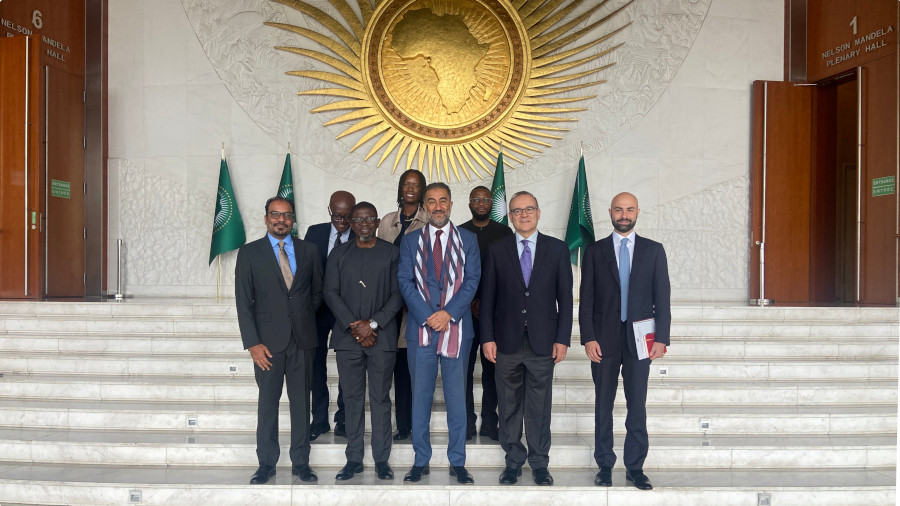The United Nations Development Programme (UNDP) hosts the G7 Italian Presidency to discuss Artificial Intelligence for Sustainable Development with African Union officials in Addis Ababa.

Addis Ababa (Ethiopia), 15 April 2024 – The G7 Italian Presidency, in collaboration with UNDP, has concluded a series of high-level meetings with African Union (AU) senior officials, African Ambassadors to the AU, the European Union Special Representative to the African Union, and stakeholders from the private sector. The outcome of the meetings is a reinforced commitment to strengthen collaboration on Artificial Intelligence (AI) for sustainable development and collectively address challenges to ensuring access to AI for all.
The Addis Ababa meetings, conducted over two days, come at the heels of the groundbreaking consensus led by Italy with the G7 ministers in Verona, Italy, on 14 March 2024. The Verona meeting recognized the imperative of concerted collaboration between G7 nations and developing countries. In partnership with UNDP, this multi-stakeholder engagement is geared towards enhancing local AI ecosystems, emphasizing democratization of computing power and fostering responsible AI development.
In addition, the convening presented an invaluable opportunity championed by the Italian G7 Presidency in partnership with UNDP to discuss AI as a priority for the achievement of the Sustainable Development Goals (SDGs). Together, they are facilitating a series of consultations characterized by diverse perspectives, expert counsel, and the unique perspectives of the AU. The discussions served as a pivotal platform to foster exchange on innovative strategies and insights, and the advancement of a common goal; harnessing AI to propel the achievement of sustainable development in Africa.
The delegation met with H.E. Ambassador Fathallah Sijilmassi, Director General of the African Union Commission (AUC). This session laid the groundwork for constructive dialogue and set the tone for subsequent engagements.
Discussions continued at the UNDP Regional Service Centre for Africa (RSCA), where Matthias Naab, Director of the RSCA, shared, “Through our collaborative efforts and knowledge partnership with the G7 Presidency, we aim to empower AU Member States with the tools and frameworks for responsible AI deployment, ensuring that no one is left behind in the journey towards inclusive innovation and progress.”
Discussions were also held with a number of stakeholders, including Ramiz Alakbarov, UN Resident and Humanitarian Coordinator, H.E. Ms. Jainaba Jagne, the Ambassador of the Gambia to the AU in Ethiopia, H.E. Mr. Javier Niño Pérez, the EU Ambassador to the African Union, and H.E. Prof. Mohammed Belhocine, Commissioner of Education, Science, Technology, and Innovation at the AU. These meetings underscore the G7 Italian Presidency's commitment to enhancing cooperation with the AU and its Member States to tackle Artificial Intelligence for Sustainable Development collectively. By fostering dialogue and collaboration, both parties aim to achieve shared objectives and contribute to a more prosperous and sustainable future for all.
The G7 Italian Presidency delegation was led by the Industry Working Group Co-Chair and Minister Plenipotentiary, Mr. Vincenzo Del Monaco. "The Italian G7 Presidency is committed to collaborating with UNDP, the African Union and African partners to steer global collective action and address critical infrastructure challenges in local AI ecosystems within African countries, specifically in the areas of data, compute and talent. The AI Hub aims to be a catalyser for systemic change and accelerate the achievement of the Sustainable Development Goals. The benefits of an AI empowered Africa will have a positive impact not just within the African continent but across the world," he stated.
Building on the achievements in Italy through the 'G7 Verona Process on Digital Development’, the Italian G7 Presidency and UNDP will continue their engagement to co-design an AI Hub for Sustainable Development with African leaders in 2024. This initiative will involve stakeholders from the technology industry, academia and start-ups committed to advancing the Sustainable Development Goals (SDGs).